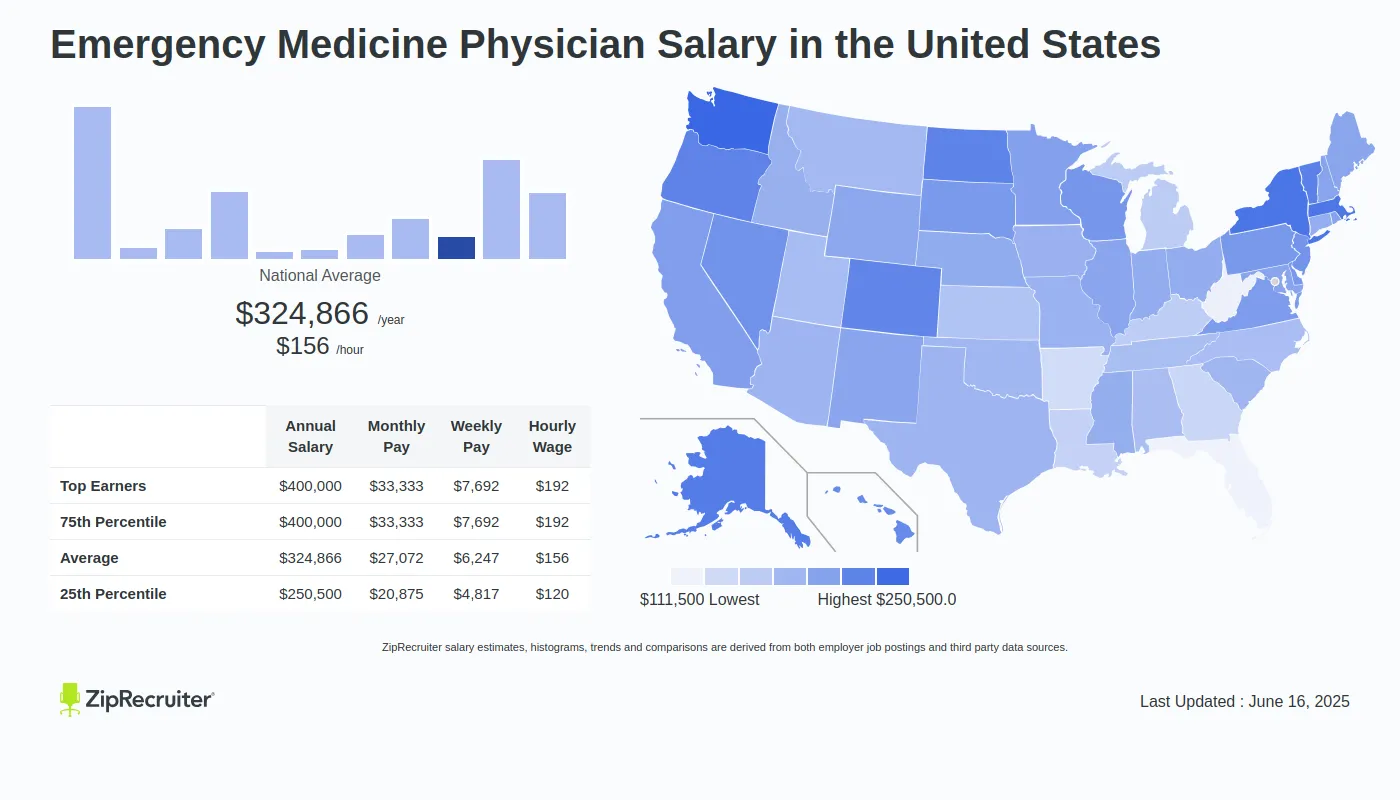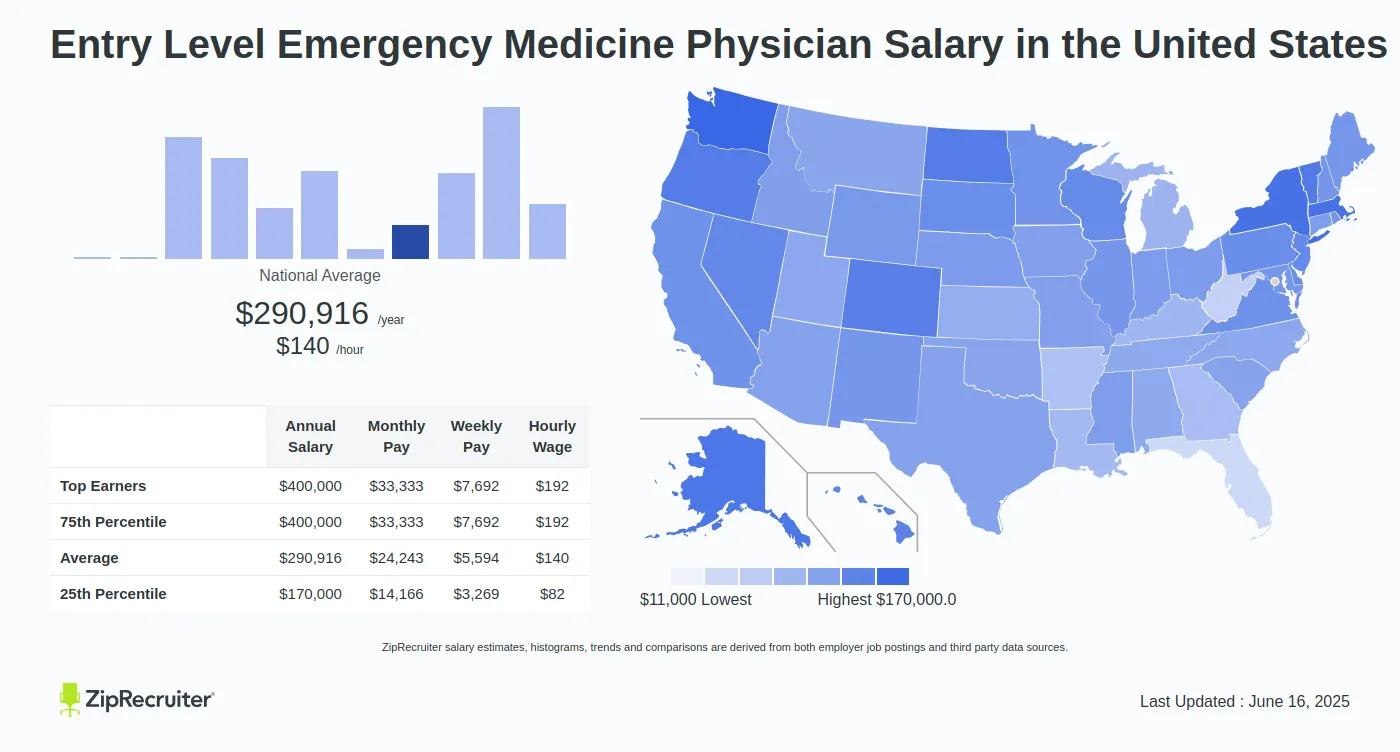Are you curious about the financial rewards that await those who dedicate themselves to the demanding world of emergency medicine? The average emergency medicine physician salary in the United States hovers around $385,554 , a testament to the crucial role these professionals play in healthcare, and a figure that often surpasses the earnings of other physician specialties.
Navigating the complex landscape of emergency medicine compensation requires a deep dive into various factors. From understanding the nuances of subspecialties and geographic variations to analyzing the impact of experience and practice setting, the path to financial success in this field is multifaceted. This exploration will unravel the key components that shape an emergency medicine physician's earning potential.
| Category | Details |
|---|---|
| Average Annual Salary (2023) | $385,554 |
| Average Hourly Rate (National) | $230 per hour (approximate) |
| 2023 Salary Trend | Up 8% from 2022 |
| High-Earning Percentile | Those in the 75th percentile can earn $400,000 or more |
| Bonus Compensation | Average bonus of $20,527 |
| Comparison to Other Specialties | Generally higher than the average physician pay |
| Key Factors Influencing Salary | State, region, setting, experience level, subspecialty, and industry |
| Resident/Fellow Salary | $60,046.23+ |
| Example: Charlotte, North Carolina | $332,687 (equivalent to $160/hour) |
| Example: California | $402,600 or $194 per hour (ranging from $325,609 to $454,182 and $157 to $218) |
| Example: Chicago, Illinois | $377,200 or $181 per hour (ranging from $304,985 to $425,534 and $147 to $205) |
| Example: Virginia | $367,500 or $177 per hour (ranging from $297,196 to $414,688 and $143 to $199) |
| Emergency Medicine Physician Assistant Salary | $146,189/year in the united states (range: $131,569 to $163,319) |
| Salary Impact: Location and Experience | Varies; incentive shifts ($160 to $200/hr) |
| COVID-19 Job Market Impact | Nearly two years post-COVID: market is up about 20 percent from last year |
| 2023 Drop in Salary | Average salary dropped 16.7% in 2023 to $302,200 |
| Source: | Example.com (replace with a real, relevant website) |
The financial landscape of emergency medicine is significantly shaped by the location of practice. States such as California frequently top the charts, offering some of the highest compensation packages. However, the cost of living in these areas must also be considered. Conversely, states with a lower cost of living may offer slightly reduced salaries, but the overall financial well-being can be comparable due to the lower expenses.
The setting in which an emergency physician practices also plays a crucial role in determining their salary. Private practice settings often offer more competitive compensation packages than academic or government-run hospitals. Factors such as the volume of patients seen, the complexity of cases, and the specific needs of the community all influence the financial opportunities available.
Experience is a powerful driver of income in emergency medicine. As physicians gain years of practice, their expertise and efficiency increase, leading to higher earning potential. Furthermore, specialized training and board certifications can significantly enhance a physician's marketability and influence salary negotiations.
The emergence of locum tenens opportunities provides a unique avenue for emergency medicine physicians to supplement their income. These temporary positions can offer lucrative hourly rates, particularly in areas facing staffing shortages. While the work may be intense, the financial rewards can be substantial.
The specific subspecialty chosen within emergency medicine can also impact earning potential. While all emergency medicine physicians are well-compensated, certain subspecialties such as trauma, critical care, and toxicology may command higher salaries due to their specialized skill sets and the high demand for these services.
It's important to understand that the emergency medicine job market has experienced fluctuations in recent years. The COVID-19 pandemic significantly impacted the landscape, leading to changes in workload, staffing levels, and, consequently, compensation. While the market has shown signs of recovery, it's crucial for physicians to stay informed about the latest trends and negotiate effectively.
The financial rewards of emergency medicine are undeniable, but it's essential to consider the demanding nature of the profession. Emergency physicians often face long hours, high-stress situations, and the constant pressure of making critical decisions under time constraints. The emotional toll of this work can be significant.
Therefore, a successful career in emergency medicine requires not only clinical expertise but also strong emotional resilience, adaptability, and the ability to thrive in a dynamic environment. For those who possess these qualities, the financial rewards can be exceptionally gratifying.
The American College of Emergency Physicians (ACEP) is a valuable resource for those seeking to stay abreast of salary trends and industry developments. Their reports and archives provide up-to-date information on compensation, practice settings, and other factors influencing the financial landscape of emergency medicine. Additionally, websites like Medscape and Salary.com offer helpful salary comparisons and career resources.
It's also crucial to consider the broader economic context. Inflation, healthcare policies, and insurance reimbursement rates all impact physician compensation. Staying informed about these external factors allows physicians to make informed decisions about their career paths and financial planning.
Furthermore, understanding the various compensation models is essential. Some physicians are employed by hospitals or healthcare systems and receive a fixed salary, while others may be partners in private practices with potential for profit sharing. Carefully evaluating these different models can help physicians find the arrangement that best suits their needs and financial goals.
In the evolving landscape of healthcare, the role of advanced practice providers (APPs) such as nurse practitioners and physician assistants is increasing. While APPs play a vital role in augmenting healthcare, their presence can also influence the demand for emergency medicine physicians and the associated compensation. Adapting to these changes is vital for long-term career success.
Finally, maintaining a strong network of professional contacts is crucial. Networking with colleagues, attending industry events, and seeking mentorship from experienced physicians can provide invaluable support and guidance throughout a career in emergency medicine. Sharing experiences and knowledge can help physicians navigate the challenges and maximize their financial opportunities.


